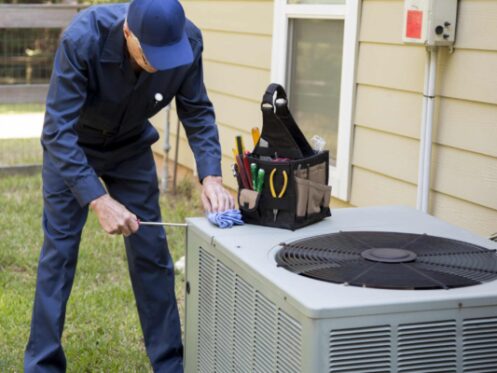While your heating system is designed to last for many years, it will eventually need to be repaired or replaced. But how do you know when it’s time for an upgrade or a repair job?
On the surface, many heating problems might appear to require a full system replacement. In some cases, a repair is all that’s necessary to bring your heater back up to speed. Here are some important considerations when deciding whether to repair or replace your heating system.
Age and Efficiency
All heating systems have a limited lifespan. As your heater ages, it may become increasingly unreliable or inefficient. All other factors aside, an older system is much more likely to need a full replacement than a newer one.
Even if the issue at hand can be resolved with a repair, it might not be cost-effective to do so with an older system. Heating systems become less energy efficient as they age, so a new upgrade could save you money on heating bills over the long term. Plus, the results of a repair on an older system are more likely to be short-lived, prompting you to call for repairs again soon. There’s also the issue of locating the proper repair parts for an older system, as they may not be readily available, and if they can be located, they may be more expensive to acquire.
In general, if your system is approaching or has already passed 15 years old, it may be time to consider an upgrade. If your system is well below this threshold, repair is likely your best option. If you’re not sure how old your system is, check the serial number or contact the manufacturer, who might have a record of the original purchase date.
Frequency of Repairs
If you’re experiencing a recurring problem with your heater, it might be a sign that you have a bigger issue on your hands. The cost of frequent repairs can add up quickly, and habitually repairing a subpar system can often be more expensive than just replacing the whole system.
The convenience and peace of mind of a replacement are also hard to beat. By taking the plunge and replacing your heating system, you won’t need to constantly worry about when the next breakdown will strike. This will allow you to enjoy your home more comfortably and confidently without the fear of a sudden malfunction.
On the other hand, if you run into an occasional and minor issue here and there, such as a clogged air filter or low refrigerant, repair may be your best bet. Just remember to keep track of how often you’re running into problems; if it’s more than once per year, you may want to consider a system replacement for long-term savings and convenience.
Safety
Faulty heating systems can be a danger to you and your family, and a potentially hazardous problem should be dealt with immediately. Some safety issues can be resolved with a repair, but other scenarios may call for a full replacement. For example, if your furnace is emitting carbon monoxide or has damaged electrical wiring, it’s probably best to replace the system rather than try to repair it.
A qualified HVAC technician can inspect your system and let you know whether repair or replacement is the best solution. If they determine that a replacement is necessary for your safety, it’s best to follow their advice and invest in a new system. The risks of continuing with a faulty system are simply too great.
It’s important to make sure that your current system is up-to-date with local safety codes and regulations, such as those regarding the installation of carbon monoxide detectors. Some jurisdictions have updated their safety codes over the years, so an older system may no longer comply with local standards. If this is the case, you may need to purchase a new heating system, regardless of its operating condition. An experienced technician can let you know if this is the case.
Comfort
A top-of-the-line heating system provides superior comfort compared to an older unit. Repairs may be able to improve the efficiency of your system slightly, but a full replacement is usually the only way to get to a premium level of comfort. If you’re not happy with the comfort that your current heater provides and repairs aren’t giving you the results you desire, a replacement is probably the best option.
Technology and design have come a long way in recent years, and older systems are simply not equipped to provide the same level of service that more modern units can. In addition to having better temperature control and energy efficiency, you’ll also be able to enjoy contemporary amenities such as programmable thermostats and zoned heating systems.
Of course, comfort comes at a cost. An upgraded heating system will likely require more of an upfront investment than performing repairs or maintenance. This is where it’s important to weigh your comfort needs against the cost of a replacement. If you can live with the natural limitations of your current system, you might want to stick with a repair. But if comfort is your highest priority, a replacement may be worth the price tag.
Financial Considerations
Many of the above factors already touched on the issue of cost, but there are a few other ways that cost can influence your decision. For starters, you’ll want to consider your heating system’s warranty. If your system is still under warranty, some or all of the costs associated with a repair could be covered.
Consider any rebates or tax breaks that you might be eligible for. Many local and federal government programs offer incentives to encourage energy efficiency, and a new heating system upgrade may qualify you for these benefits. The Inflation Reduction Act of 2022, for example, provides significant tax credits and rebates for homeowners who invest in a new heat pump system.
Finally, you should think about whether you plan to move in the near future. If you’re just looking to stay for a few more years, you may want to go with repairing your system. This will help you maximize your return on investment by avoiding the cost of a new system that you will not be able to take with you when you leave. In some cases, though, the value of a new system can be recouped when you sell your home.
The decision of whether to replace or repair your heating system may not be as straightforward as you would prefer. By weighing your comfort needs and budget against the various factors outlined in this article, you can make an informed decision that works for your home and family. And if you’re ever unsure of what to do, don’t hesitate to contact an HVAC technician at Environmental Heating & Air Solutions for personalized advice. We’ve been providing residents of Northern California with top-quality heating, cooling, indoor air quality, and plumbing services for over a decade, and we’d love to do the same for you.

